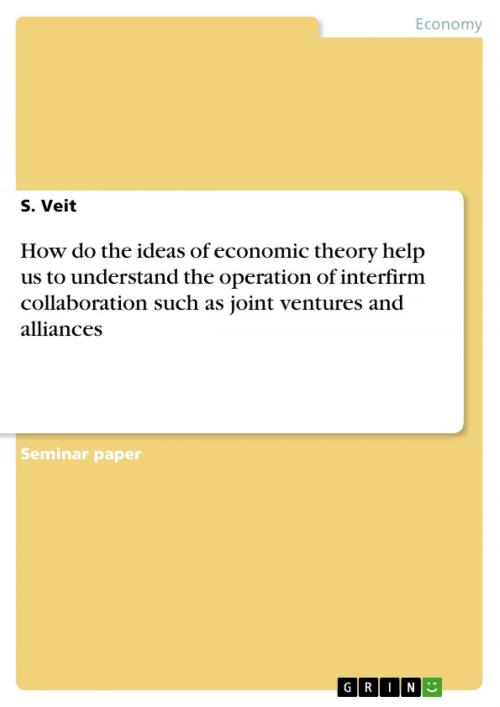How do the ideas of economic theory help us to understand the operation of interfirm collaboration such as joint ventures and alliances
Business & Finance, Management & Leadership, Leadership| Author: | S. Veit | ISBN: | 9783638364768 |
| Publisher: | GRIN Publishing | Publication: | April 11, 2005 |
| Imprint: | GRIN Publishing | Language: | English |
| Author: | S. Veit |
| ISBN: | 9783638364768 |
| Publisher: | GRIN Publishing |
| Publication: | April 11, 2005 |
| Imprint: | GRIN Publishing |
| Language: | English |
Seminar paper from the year 2004 in the subject Economy - Theory of Competition, Competition Policy, grade: 75%, South Bank University London, course: Economics of the Firm, language: English, abstract: Since the 1980s joint ventures and strategic alliances have enjoyed great popularity with firms, mainly in new and technology-intensive industries (Grabher p.12). Where two competitive firms work together to achieve a common purpose, this cooperation is named interfirm collaboration. Such collaborations are famous for their aim to avoid negative effects of competition or to benefit from the transfer of information and skills. The fact that competitors decide to establish a quasi - contractual relationship rather than to compete is discussed by various economic theories. The following implementations deal with these economic approaches. At first circumstances that lead firms to collusive behavior are analyzed, followed by specifying game theory as a suitable model to explain why firms decide to collaborate. The third part of this paper analyses various kinds of contractual relationships between collaborating firms, leading to a brief outline on stability of collaboration and problems appearing in such relationships.
Seminar paper from the year 2004 in the subject Economy - Theory of Competition, Competition Policy, grade: 75%, South Bank University London, course: Economics of the Firm, language: English, abstract: Since the 1980s joint ventures and strategic alliances have enjoyed great popularity with firms, mainly in new and technology-intensive industries (Grabher p.12). Where two competitive firms work together to achieve a common purpose, this cooperation is named interfirm collaboration. Such collaborations are famous for their aim to avoid negative effects of competition or to benefit from the transfer of information and skills. The fact that competitors decide to establish a quasi - contractual relationship rather than to compete is discussed by various economic theories. The following implementations deal with these economic approaches. At first circumstances that lead firms to collusive behavior are analyzed, followed by specifying game theory as a suitable model to explain why firms decide to collaborate. The third part of this paper analyses various kinds of contractual relationships between collaborating firms, leading to a brief outline on stability of collaboration and problems appearing in such relationships.















